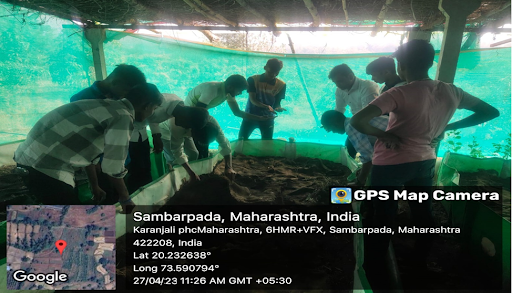

The primary objective of “Vermicompost Unite” is to promote sustainable waste management practices in higher education institutions by converting organic waste into nutrient-rich compost using vermiculture. This initiative enhances environmental awareness among students, faculty, and staff while fostering a culture of eco-friendly practices. It also serves as a hands-on learning tool, integrating sustainability concepts into academic and extracurricular activities to develop skills in waste management and organic farming.
The institution faced challenges related to the disposal of organic waste generated from canteens, hostels, and gardens. Traditional waste disposal methods often led to environmental pollution and were not aligned with the institution’s goal of sustainable development. Additionally, the lack of awareness about waste management among the campus community was a barrier. To address these issues, “Vermicompost Unite” was designed to convert organic waste into useful compost, reduce the carbon footprint, and provide an educational platform for sustainability.
“Vermicompost Unite” involves the collection, segregation, and conversion of organic waste into compost using earthworms. Waste is collected from various campus locations, ensuring proper segregation at the source. Specially designed vermicomposting pits are established, where earthworms are introduced to decompose organic material. The process produces high-quality compost, which is then used for gardening and farming activities within the campus.
This initiative integrates sustainability into the curriculum and encourages student participation. Workshops and training sessions engage students in learning about vermiculture and waste management. The initiative faced initial constraints, such as limited funding and stakeholder resistance, but awareness campaigns and demonstrations helped overcome these challenges.
The success of “Vermicompost Unite” is reflected in the measurable reduction of organic waste on campus and the production of high-quality compost. Monthly audits showed a 60% reduction in organic waste sent to landfills. The compost produced has significantly improved soil quality in campus gardens, reducing the need for chemical fertilizers.
Additionally, feedback from students and staff indicates increased awareness and enthusiasm for sustainability practices. The practice has been recognized as a model for other farmers, with several nearby villages expressing interest in replicating it.
Initial challenges included inadequate funding and space for setting up vermicomposting units. Resistance from some stakeholders due to unfamiliarity with the concept required targeted awareness campaigns and training sessions. Resources required for successful implementation included financial support for infrastructure, a regular supply of organic waste, and skilled personnel to manage and monitor the process. Support from administrative staff and collaboration with sustainability experts were critical to overcoming these challenges.

Breeding and Growth of Earthworms in Vermicomposting Project
Earthworms are used to decompose organic matter into stable organic material. The above picture, taken on April 27, 2023, shows the breeding and growth of different species involved in the vermicomposting project.

Students were visiting the vermicomposting unit at Sambarpada Village 27 April 2023
We implement vermicomposting techniques, an eco-friendly option for managing domestic waste. This process of converting organic waste into stabilized organic matter is best suited for housing societies. It is an effective method for recycling organic waste and ensuring a cleaner and healthier environment.
A large amount of agro waste is collected from the marketplace for vermicomposting in our college. Vermicomposting is the best biotechnology to reduce biodegradable agro waste in our area.

Vermicomposting Process

Organic Waste Collection for Composting

Final Vermicompost Product
Vermicomposting, the process of using earthworms to decompose organic waste into nutrient-rich compost, is an efficient and eco-friendly method of waste management. For zoology students, understanding the principles and practices of vermicomposting offers valuable insights into the role of decomposers in ecosystems and sustainable waste management strategies.
This report aims to provide zoology students with a comprehensive understanding of vermicomposting units and their significance in waste management.
A typical vermicomposting unit consists of containers or bins filled with organic waste materials such as kitchen scraps, yard waste, and shredded paper. Earthworms, specifically Eisenia fetida or red wigglers, are introduced into the bins to consume and break down the organic matter. Proper aeration, moisture levels, and temperature control are essential for optimizing the vermicomposting process.
Vermicomposting offers several benefits for waste management. Firstly, it diverts organic waste from landfills, reducing methane emissions and overall environmental impact. Secondly, the resulting vermicompost is a nutrient-rich fertilizer that can improve soil health and promote plant growth. Additionally, vermicomposting reduces the need for chemical fertilizers, contributing to sustainable agriculture practices.
Zoology students can gain hands-on experience with vermicomposting units through practical demonstrations and experiments. They can observe the interactions between earthworms and organic matter, study decomposition processes, and analyze the chemical composition of vermicompost. Moreover, students can explore the ecological significance of earthworms as decomposers and their role in nutrient cycling within ecosystems.
In conclusion, vermicomposting units offer an accessible and practical way for zoology students to learn about waste management and ecological principles. By understanding the processes involved in vermicomposting and its environmental benefits, students can contribute to sustainable practices both academically and in their communities. Incorporating vermicomposting into zoology curricula enhances students' appreciation for the interconnectedness of organisms and ecosystems, fostering a deeper understanding of ecological concepts.

Distribution of vermi eggs and worms to near by farmers for growing new worms in earlier built bed dated on 03/01/2020